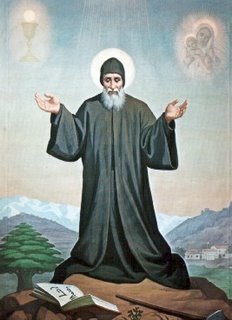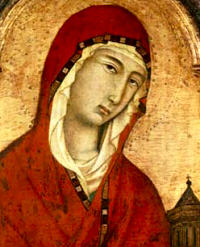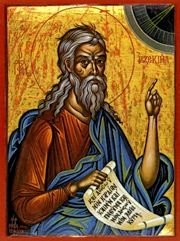Are YOU ready for Mass this Sunday?
I know that we are all busy folk, but how many of us prepare for Sunday Mass? If you truly hope to enter into the beauty of the divine liturgy (heaven on earth), then you need to prayerfully prepare a little. If you do not do a little preparation, you might find yourself constantly distracted during the Mass, missing parts of the readings, etc. One great way to prepare for Mass is to read over the readings a few days before Sunday. ... Allow a couple days to mull over God's word... He will speak to you through those readings. Today is Wednesday, so why not check out the readings for next Sunday today (click here: http://www.usccb.org/nab/073006.shtml ).
After you check out the readings, take a look at the following reflection on the readings. These weekly reflections are produced by Scott Hahn's St. Paul Center for Biblical Theology (I have a link to their site in my links section). Scott Hahn has written many interesting books on such topics as the Mass, the Blessed Virgin Mary, the sacrament of Confession, etc.
---------------------
Biblical Reflections on the Sunday Mass Readings
copyright St. Paul Center for Biblical Theology www.salvationhistory.com
"Bread Left Over"
[July 30, 17th Sunday in Ordinary Time] [2 Kings 4:42-44; Psalm 145:10-11, 15-18; Ephesians 4:1-6; John 6:1-15]
Today's liturgy brings together several stands of Old Testament expectation to reveal Jesus as Israel's promised Messiah and king, the Lord who comes to feed His people.
Notice the parrallels between today's Gospel and the First Reading. Both Elisha and Jesus face a crowd of hungry people with only a few "barley" loaves. We hear similar words about how impossible it will be to feed the crowd with so little. And in both the miraculous multiplication of bread satisfies the hungry and leaves food left over.
The Elisha story looks back to Moses the prophet who fed God's people in the wilderness (see Exodus 16). Moses prophesied that God would send a prophet like him (see Deuteronomy 18:15-19). The crowd in today's Gospel, witnessing His miracle, identifies Jesus as that prophet.
The Gospel today again shows Jesus to be the Lord, the good shepherd, who makes His people lie down on green grass and speads a table before them (see Psalm 23:1, 5).
The miraculous feeding is a sign that God has begun to fulfill His promise, which we sing of in today's Psalm--to give His people food in due season and satisfy their desire (see Psalm 81:17).
But Jesus points to the final fulfillment of that promise in the Eucharist. He does the same things He does at the Last Supper--He takes the loaves, pronounces a blessing of thanksgiving (literally, "eucharist"), and gives the bread to the people (see Matthew 26:26). Notice, too, that 12 baskets of bread are left over, one for each of the apostles.
These are signs that should point us to the Eucharist--in which the Church founded on the apostles continues to feed us with the living bread of His body.
In this Eucharist, we are made one body with the Lord, as we hear in today's Epistle. Let us resolve again, then, to live lives worthy of such a great calling.
Labels: Sacred Scripture





